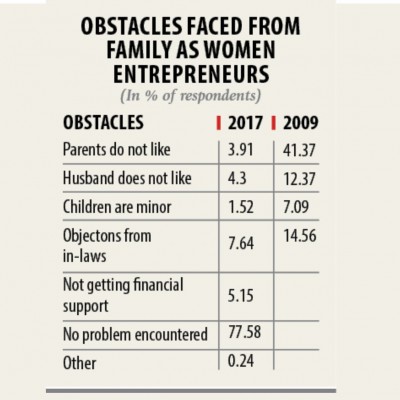Barriers ease for women in SMEs: survey

Women are facing less social and family challenges in doing business in Bangladesh compared to several years ago, an improvement that will buoy up more females to try their luck in entrepreneurship, according to a report released yesterday.
The report – Women Entrepreneurs in SMEs: Bangladesh Perspective 2017 – also found that the number of undergraduate and postgraduate women increased significantly between 2009 and 2017.
The SME Foundation unveiled the survey report at a meeting at the Cirdap Auditorium in Dhaka. The survey was conducted among 1,510 women entrepreneurs in the small and medium enterprise (SME) segment across the country.
According to the survey, 41.37 percent respondents said their parents did not like them to be entrepreneurs in 2009, but the percentage came down to less than 4 percent in 2017.
Similarly, obstacles from husband’s disliking also dropped to 4.3 percent from 12.37 percent during the period.
More interestingly, 77.58 percent women entrepreneurs surveyed said they do not face any problem from families during their journey.
As family problems have almost been solved, highly educated women are coming to build SMEs. In 2017, 25.9 percent women entrepreneurs had undergraduate degrees, from 20 percent in 2009.
At the event, Industries Minister Nurul Majid Mahmud Humayun said the government is emphasising on the development of the SME sector because about 85 percent jobs were created from the sector.
The SME sector also contributes to the growth of the country’s industrial sector by supplying raw materials, he said.
The minister also said the country’s expected economic development would not be possible by keeping women jobless.
SMEs will ensure increased participation of women in the economy, he said.
The survey showed social barriers to women entrepreneurs also declined: in 2017, some 13.73 percent respondents said that people did not like women to enter entrepreneurship, way down from 28 percent in 2009.
KM Habib Ullah, chairperson of SME Foundation, presided over the session where Nazneen Ahmed, senior research fellow of the Bangladesh Institute of Development Studies, and Md Safiqul Islam, managing director of the foundation, also spoke.
